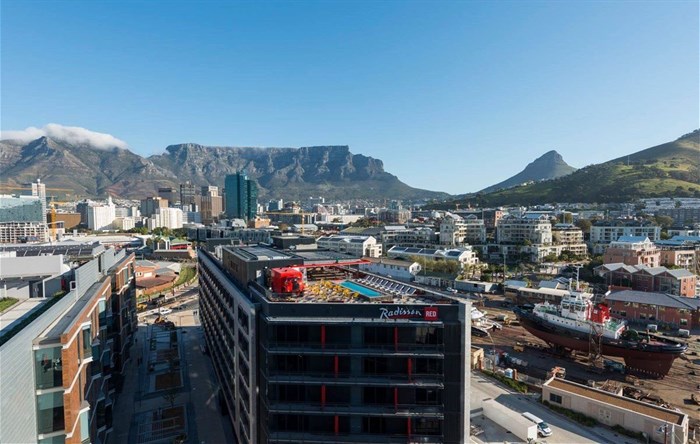
Top stories






More news
















"The inspiration for the concept was in response to a shift in global attitudes," says Sue Levy, lead community, marketing and digital of the Radisson RED in Cape Town. "We use the word 'millennial' but that’s not enough to clarify our inspiration. The millennial aspect represents a mindset rather than a certain demographic and the development of Radisson RED was a direct response to this."
Radisson RED has learned that this market travels overseas more than three times a year (and as a sole traveller 30% of the time). These numbers influence the development of its social hives, ensuring the hotel offers guests what they are looking for technologically, socially, and in other ways.
"The millennial market is growing," Levy says. "We know they’re travelling more and will continue to grow as a major contributor to the travel market. We also know they seek and demand 'real' experiences led by locals, where they can share where they’ve been or find unique content. Radisson RED looks to provide that content and support finding the unique experiences. In other areas, it’s about having fun. For example, we can pick you up in a car but you can also hire a branded skateboard, motorbike, scooter, or old-school bicycle."
Indeed, Levy believes that a hotel industry that doesn’t often question the 'cookie-cutter' approach could use a wake-up call. While there are some fantastic examples of innovative approaches, the competition from new accommodation options (such as Airbnb) means that traditional hotels need to adapt. Specifically, they need to cater to local tastes.
"Branded hotels have a challenge in terms of how much to brand and how much to localise," she says. "In the last decade, we’ve seen a huge emergence of trends such as artisan, forage, localisation, and craftsmanship. And brands need to embrace this. But brands can be too stagnant; they are unable to embrace this cultural trend and put too much emphasis on consistency rather than on creativity or innovation. That said, the hotel industry is becoming more and more innovative and that should hold an evolving institution in good stead for a bright future."
The hotel in Cape Town was the third Radisson RED, following openings in Brussels (Belgium) and Minneapolis (USA). It appeals to the millennial mindset with its shared working hubs and lots of music, fashion, and artistic inspiration.
"We work on a sense of place within our rooms," she says. "All studios have an oversized window so you can enjoy the amazing city. We chose a picnic table rather than a desk against a wall. It’s more social and perfect for dinner with friends or a work night. And we’re right in the V&A Waterfront’s new Silo District, beside the Zeitz Museum of Contemporary Art Africa, which, from an artistic point of view, is a perfect complement."
The hotel offers four ‘Events & Games’ studios with a maximum capacity of 100 (unless you hold meetings on the RED Roof – with a kitchen grill, bar, and outdoor pool – that accommodates up to 120). These are equipped with vinyl players, beanbags, Ping-Pong tables, and more.
"Our spaces are social and fully open to the public and residents alike," Levy says. "OUIBar & Ktchn offers a celebration of Cape Town with a variety of local dishes given a twist. All our wines and beers are from the Western Cape and we are proud of that. We work hard to showcase the best."
Indeed, Levy admits that it’s a challenge to capture the hearts of a market that might not be brand loyal. This is why she believes that "we can lose our market but we can never assume we have gained it".
"The brand uses inspirations rather than prescriptive standards, allowing us to maintain a current and vibrant approach where change and creativity are the constant," she says. "This creates vibe and consistent but differing content that appeals to our markets. For example, we are currently brewing our own beer and, in all of our areas, will question what a sense of place means and how we can bring this to life."
After the first three locations, Radisson RED expanded to Campinas (Brazil), Glasgow (Scotland), and Portland (USA). Further hotels are planned for Dubai (UAE), Krakow (Poland), Tbilisi (Georgia), and Riga (Latvia), amongst others. The goal is to choose locations that complement its desired inspirations and provide a natural synergy and platform from which to successfully launch the brand.
"With many other possibilities in the pipeline, Radisson RED’s development is in full swing," Levy says. "The feedback has been that the people are amazing and that the concept is fresh. It’s a brand with a great attitude; a brand that genuinely cares about your experience."
There are many ways the brand curates its products to deliver on this sense of place. For example, it ran a competition called #REDexperiment, in which it asked artists and designers to create coffee cups for the hotel. The two winning designs received ZAR 10,000 each, bringing artistic inspiration to life and showcasing the skills of talented local individuals.
Eugene Yiga was a guest of Radisson RED.
